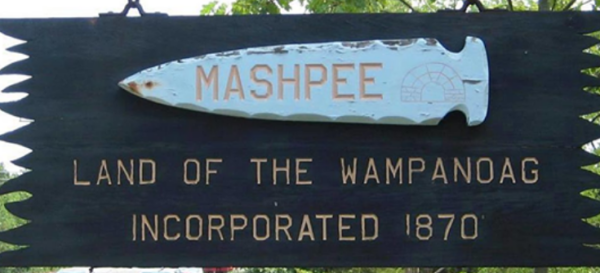
- Details
- By Native News Online Staff
WASHINGTON — A government plan to disestablish the Mashpee Wampanoag Tribe’s reservation has been put on a temporary hold after lawyers for the U.S. Dept. of Interior agreed it would refrain from taking the Tribe’s land out of trust for 45 days.
A federal judge has agreed to temporarily halt the process in a ruling issued in the United States District Court for the District of Columbia. In court documents, Judge Paul L. Friedman said the Tribe’s request for a temporary restraining order would be temporarily suspended as long as the DOI refrains from taking the land out of trust.
The Mashpee Wampanoag Tribe had filed a motion for a temporary restraining order on March 31 to keep the DOI from taking 321 acres of tribal land out of federal trust. The trust lands at issue include approximately 170 acres in the town of Mashpee, Mass. and approximately 151 acres in the town of Taunton, Mass.
The court filing states that the DOI agreed to "refrain from completing the ministerial tasks necessary to record transfer of the land out of trust, revoke the reservation proclamation, or annul the gaming eligibility described in the [DOI] March 27 memorandum for a periofd of 45 days from March 31, 2020 o and including May 15, 2020."
The DOI was ordered to file its oppositions for the Tribe's preliminary injunction on or before April 20, 2020. The Tribe will file its reply on or before May 5.
The ruling comes a day after a bipartisan group of U.S. House members sent a letter to the Senate, urging Majority Leader Mitch McConnell (R-KY) to take up legislation that would protect the Mashpee Wampanoag Tribe from a federal government effort to disestablish their reservation.
The letter, dated April 3, urges the Senate to pass H.R. 312, the Mashpee Wampanoag Tribe Reservation Reaffirmation Act, which would reaffirm the trust status of Tribal land taken into trust in 2015 by the Obama Administration. The legislation, introduced by Reps. Joe Kennedy III (D-Mass.) and Bill Keating (D-Mass.) passed the house in May 2019 by the House 275-146 in a bipartisan vote.
The move by the Dept. of Interior to disestablish the Tribe’s reservation during the global COVID-19 pandemic, has generated criticism and media attention from around the world. The move would impact the Tribe’s ability to provide health, safety and other services to its members and could have an impact on other tribes around the country.
How to help Native News Online: Send us news. Sign up for our daily enewsletter. Follow us on Facebook and Twitter. Share our articles. You can also donate to Native News Online here. Most importantly, take care of yourself. Megwetch.
More Stories Like This
50 Years of Self-Determination: How a Landmark Act Empowered Tribal Sovereignty and Transformed Federal-Tribal RelationsNavajo Nation Council Members Attend 2025 Diné Action Plan Winter Gathering
Ute Tribe Files Federal Lawsuit Challenging Colorado Parks legislation
NCAI Resolution Condemns “Alligator Alcatraz”
NABS Documents 134 More Survivor Stories, Expands Digital Archive in 2025
Help us defend tribal sovereignty.
At Native News Online, our mission is rooted in telling the stories that strengthen sovereignty and uplift Indigenous voices — not just at year’s end, but every single day.
Because of your generosity last year, we were able to keep our reporters on the ground in tribal communities, at national gatherings and in the halls of Congress — covering the issues that matter most to Indian Country: sovereignty, culture, education, health and economic opportunity.
That support sustained us through a tough year in 2025. Now, as we look to the year ahead, we need your help right now to ensure warrior journalism remains strong — reporting that defends tribal sovereignty, amplifies Native truth, and holds power accountable.
 The stakes couldn't be higher. Your support keeps Native voices heard, Native stories told and Native sovereignty defended.
The stakes couldn't be higher. Your support keeps Native voices heard, Native stories told and Native sovereignty defended.
Stand with Warrior Journalism today.
Levi Rickert (Potawatomi), Editor & Publisher

